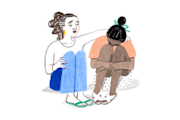Explore relationship issues topics
Relationship Issues
At any given time, people manage multiple relationships, including those with a loved one, children, other family members, friends, coworkers, and romantic relationships.
Each of these relationships can provide a mix of love, joy, support, and excitement; yet they can also cause grief and heartache. Each of our relationships has its own set of obligations and possible conflict, and each has the ability to impact how we feel at any given moment.
Distress in a relationship, regardless of the reason, can lead to a variety of issues, including codependency, loneliness, anxiety, and depression, to name a few. And even the most well-matched and loving couples will experience the occasional conflicts or misunderstandings that escalate to a point where they are unable to resolve their differences in a positive manner.

What causes conflict in relationships?
Problems in relationships can almost always be linked back to one or more of the following:
Financial stress
Work stress
Having children
Arguments
In-laws
Poor health
Poor communication
Hurt feelings
Sexual frustration
Exhaustion
Alcohol or drug use
Gambling problems
Relationship problems can also be triggered by a change in circumstances, such as:
Change in family circumstances (e.g., a new baby, divorce, blending of families)
Change in life circumstances (e.g., unemployment, moving, homelessness, retirement, ageing)
Death of a family member, close friend, or pet
Natural disasters (e.g., a fire, flood, or earthquake)
What are the four "horsemen of relationship" apocalypse?
Psychologist John Gottman, the leading expert on relationships and marriage, identified the relationship habits that usually lead to divorce.
Coining the phrase the "four horsemen of relationship", he Gottman found the following 4 habits lead to divorce in 90% of marriages.
Criticism, implying something is wrong with the person;
Defensiveness, warding off a perceived attack;
Contempt, behaviour that puts one person “above” another; and
Stonewalling, withdrawing from a conversation.
Such behaviors can appear in all relationships, and be performed by either partner but generally speaking, when compared to women, men are more likely to stonewall and less likely to criticise.
How are relationship problems treated?
Even when people get along well, stress from everyday life can lead to confrontations that seem impossible to work through.
There are many effective treatments available to help a person, couple, or family who is having relationship problems. The most effective is psychotherapy or talk therapy. Seeing a therapist can help couples overcome most issues, so that a complete relationship breakdown is avoided.
Some commonly used modes of therapy include individual therapy, coaching, mediation, couples counseling, and family therapy. All of these can help resolve differences, help heal wounds, and help to prevent relationships from ending.
Behavioral therapy, cognitive-behavioral therapy (CBT), dialectical behavior therapy (DBT), Gottman method, and so on are the most commonly used types of therapy used to help people deal with relationship issues.
Supporting loved ones experiencing relationship issues
Relationship issues can be a real source of stress and anxiety. The best thing that family and friends can do for a loved one experiencing these problems is to give their time. Listening in a non-judgemental manner, guiding them towards finding their own solution, and offering whatever support they need are all great ways to help.
Do you know your attachment style?
Take this free, online Attachment Styles Quiz today to find out your attachment style. Get a free, customized report too! Knowing your attachment style is the first step to understanding why you act the way you do.



